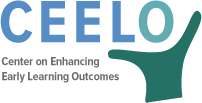This guide aims to support state education agencies and early education partners develop coherent, research-based policy by guiding thinking, discussion, data collection, and gap analyses of current practices and policies that can lead to more intentional decision making relative to young dual language learners (DLL) and English learners (EL).
Effective use of child, teacher and classroom assessment data can help teachers and educational leaders target instructional strategies and resources to achieve desired early learning outcomes. States vary in their capacity to support the use of data to inform decisions. Technical expertise can support SEA staff understanding of the nature and types of data that can be used to improve the quality of early educational experiences and ultimately early learning outcomes.
The Views of State Early Childhood Education Agency Staff on Their Work and Their Vision for Young Children: Informing a Legacy for Young Children by 2030
CEELO’s Early Childhood Legacy 2030 project seeks to inform policy decisions for children, birth to third grade, over the coming decade (2020–2030). State early childhood education agency staff are responsible for implementing policies and collaborating with other stakeholders to meet the needs of allyoung children in their states. Yet no one has adequately documented the voice, experience and perspectives of these individuals so that challenges and constraints of implementing state ECE policy can inform stakeholders. This report describes what we found about state early childhood education agency staff, the complexity of their work and what they believe is most important to realize a legacy for young children by 2030. An Executive Summary of the full report can be found here.
Estimating State Administrative Costs for Washington’s Universal Pre-K Program
CEELO is introducing a new tool to help calculate the costs of administration as part of the true cost of high-quality preschool.
The State Administrative Cost of Quality (SACQ) tool helps states generate data on the functions and costs of the State Infrastructure to Implement, Monitor and Sustain Quality of early childhood programs. The budget tool is organized around a continuum of state- and regional-level administrative capacities framework spanning policy/program development, forecasting and planning, provider recruitment, contracting, child enrollment, and workforce development. SACQ is an Excel-based model that can be integrated into the Cost of Preschool Quality & Revenue Calculator (CPQ&R) to help users determine costs and funding sources related to implementing high-quality preschool programs.
Taking Leadership to a New Level: Helping Early Intervention Leaders Adapt to Change and Move Programs and Policies to Success for Young Children
This session held during the 2018 Improving Data – Improving Outcomes Summer Data Institute aimed at helping participants better understand the characteristics of a good leader and reflect on their own leadership skills. State experiences and resources were shared that support knowledge and skill development in individual leaders. (August 2018)
Why Understanding the Costs of Preschool Quality is Important: A Webinar for Preschool Development Grantee States
This webinar presents and demonstrates the use of the Cost of Preschool Quality Tool (CPQ) by the Center on Enhancing Early Learning Outcomes, an Excel based model that can be used at the state or district level to estimate the cost of expanding high quality preschool for 3 and 4 year olds.
The Impact of Policy on the Class of 2027: Early Care and Education in South Carolina
This presentation details policy mechanisms that lead to improved child outcomes. The presentation discusses young children’s brain development, dimensions of readiness, elements and measurements of quality, the P-20 approach, and other areas policy can impact. It also includes information on return on investments in early childhood for South Carolina. Jim Squires presented at the Early Childhood Common Agenda Forum South Carolina Children’s Trust.
Facts About Fadeout
This document explores what the research says about the lasting benefits of high-quality early education programs. As interest in pre-K continues to grow, policymakers ask whether the benefits “fadeout” in elementary school. This document presents the research findings on effect size over time as well as what factors in a pre-K program are likely to foster lasting benefits.
New Early Childhood Indistar® Indicators
This webinar introduces the audience to new Early Childhood Indistar® Indicators developed by CEELO in collaboration with the Center on Innovations (CIL) in Learning. Indistar® is a web-based system for use with district and/or school improvement teams to inform, coach, sustain, track, and report improvement activities. The new early childhood indicators provide an opportunity for stakeholders to use indicators and the associated research to align early childhood education with school improvement efforts.
Where Vermont Stands: Understanding the NIEER State of Preschool Yearbook
This talk presents Yearbook information from the national level and then looks at Vermont specifically. guides on how to use the data. Jim Squires presented the slides to the Vermont Building Bright Futures State Advisory Council.
Understanding Pre-K Inclusion Data: Making the Most of the NIEER State of Preschool Yearbook
This presentation demonstrates why a high quality preschool matters in an inclusive birth through third grade context. It explains what the 2013 NIEER State of Yearbook data tells readers and how the data can be used. It concludes with a list of additional resources. Jim Squires presented these slides at the National Inclusion Institute.
Don’t Just Do the Assessment, Look at It
This resource examines examples and challenges in using assessment data, discuss what data can tell us about teaching and learning, and offers resources on using assessment data. CEELO’s Tom Schultz gave this presentation to the New Jersey Early Childhood Academy.
Formative Assessment: Guidance for Early Childhood Policymakers
This report serves as a guide and framework to early childhood policymakers considering formative assessment, outlining issues for consideration in implementing formative assessment.This guide provides a practical roadmap for decision-makers by offering several key questions to consider in the process of selecting, supporting, and using data to inform and improve instruction.
- 1
- 2
